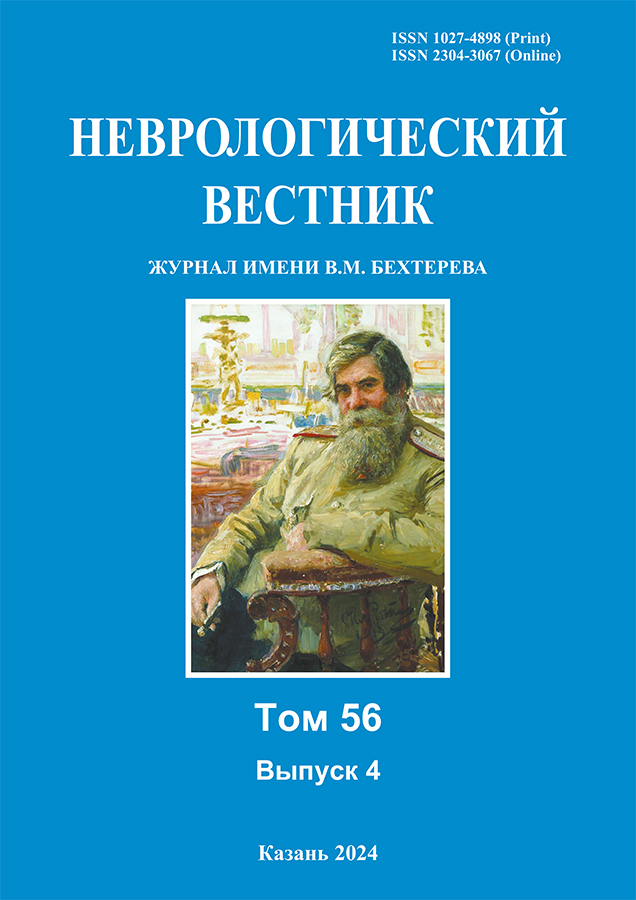Cognitive impairment in COVID-19 patients complicated by depression after the acute phase
- Authors: Vorob’еva O.V.1, Shindryaeva N.N.1,2, Fateeva V.V.3,4
-
Affiliations:
- I.M. Sechenov First Moscow State Medical University
- City Clinic No. 2
- N.I. Pirogov Russian National Research Medical University
- Federal Research and Clinical Center of Intensive Care Medicine and Rehabilitology
- Issue: Vol LVI, No 4 (2024)
- Pages: 375-384
- Section: Original study arcticles
- Submitted: 02.07.2024
- Accepted: 09.08.2024
- Published: 19.12.2024
- URL: https://journals.eco-vector.com/1027-4898/article/view/633988
- DOI: https://doi.org/10.17816/nb633988
- ID: 633988
Cite item
Abstract
BACKGROUND: Damage of the central nervous system in COVID-19 patients includes cognitive impairment, depression, and fatigue. Clinical features of cognitive impairment after the acute phase of COVID-19 and the contribution of various factors to the development of memory deficit have not been fully studied.
AIM: This study assesses the clinical features of cognitive impairment in COVID-19 patients complicated by depression after the acute phase and analyzes how health and demographic factors contribute to the development of cognitive impairment.
MATERIALS AND METHODS: The observational cross-sectional study includes 33 patients aged 18–80 (mean age: 53.5; women: 60.6%) who meet the eligibility criteria. All subjects had a clinical semi-structured interview, a general clinical examination, MoCA, HDRS-17, and MFI-20 neuropsychological tests.
RESULTS: The average MoCA-total score was 23.8±2.2. Cognitive impairments primarily affected memory (average MoCA memory score: 10.5±2.0), executive functions (average MoCA executive functioning score: 9.5±1.1), and attention (average MoCA attention score: 14.8±1.9). There is a strong negative correlation of HDRS-17 and MoCA-total values ( r=−0.72; p<0.05), executive functioning index ( r=−0.82; p<0.05), and memory index ( r=−0.85; p<0.05). Age (β=−0.028; p=0.03), number of cardiovascular risk factors (β=−0.53; p=0.001), severity of COVID-19 in the acute phase (β=−0.97; p=0.001) and depression (β=−0.065; p=0.02) are the main contributors to cognitive impairment.
CONCLUSION: Multi-domain cognitive impairment with predominant deterioration of executive functions, memory and attention was detected in patients who had COVID-19 complicated by depression after the acute phase. The key factors of, or main contributors to, cognitive impairment were identified, which can help select the best targeted therapy for this category of patients.
Full Text
About the authors
Olga V. Vorob’еva
I.M. Sechenov First Moscow State Medical University
Email: ovvorobeva@mail.ru
ORCID iD: 0000-0001-5070-926X
SPIN-code: 5280-3399
MD, Dr. Sci. (Medicine)
Russian Federation, MoscowNatalia N. Shindryaeva
I.M. Sechenov First Moscow State Medical University; City Clinic No. 2
Email: shindryaeva_n_n@staff.sechenov.ru
ORCID iD: 0000-0001-6560-2756
SPIN-code: 1516-6022
MD, Dr. Sci. (Medicine)
Russian Federation, Moscow; MoscowVictoria V. Fateeva
N.I. Pirogov Russian National Research Medical University; Federal Research and Clinical Center of Intensive Care Medicine and Rehabilitology
Author for correspondence.
Email: v.v.fateeva@mail.ru
ORCID iD: 0000-0001-9935-3962
SPIN-code: 5457-3816
кандидат медицинских наук, научный сотрудник лаборатории нейрогериатрии ОСП РГНКЦ ФГАОУ ВО РНИМУ им. Н.И. Пирогова Минздрава России;
старший научный сотрудник лаборатории экспериментальной неврологии и нейровизуализации ФНКЦ РР
Russian Federation, Moscow; MoscowReferences
- WHO: WHO coronavirus disease (COVID-19) dashboard. [cited 2024 Jan 07]. Available from: https://covid19.who.int/ (accessed 07/01/2024).
- Vorob'eva OV. Combined therapy of COVID-19 infection consequences. Doctor.Ru. 2021;20(5):13–19. EDN: BVPTCG doi: 10.31550/1727-2378-2021-20-5-13-19
- Aiyegbusi OL, Hughes SE, Turner G, et al. Symptoms, complications and management of long COVID: a review. J R Soc Med. 2021;114(9):428–442. doi: 10.1177/01410768211032850
- Vanichkachorn G, Newcomb R, Cowl CT, et al. Post-COVID-19 syndrome (long haul syndrome): description of a multidisciplinary clinic at Mayo clinic and characteristics of the initial patient cohort. Mayo Clin Proc. 2021;96(7):1782–1791. doi: 10.1016/j.mayocp.2021.04.024
- Vorob'eva OV. Affective disorders in patients with cerebral microangiopathy during the COVID-19 pandemic. RMJ. 2021;29(5):35–41. EDN: TEJDUN
- Korabelnikova EA, Vorob'eva OV, Makarov SA, Danilov AB. Sleep disorders in doctors in the context of the COVID-19 pandemic. Medical Alphabet. 2021;(3):48–56. EDN: XKLGUY doi: 10.33667/2078-5631-2021-3-48-56
- Hamilton M. A rating scale for depression. J Neurol Neurosurg Psychiatry. 1960;23(1):56–62. doi: 10.1136/jnnp.23.1.56
- Nasreddine ZS, Phillips NA, Bédirian V, et al. The Montreal cognitive assessment, MoCA: a brief screening tool for mild cognitive impairment. J Am Geriatr Soc. 2005;53(4):695–699. doi: 10.1111/j.1532-5415.2005.53221.x
- Julayanont P, Brousseau M, Chertkow H, et al. Montreal cognitive assessment memory index score (MoCA-MIS) as a predictor of conversion from mild cognitive impairment to Alzheimer's disease. J Am Geriatr Soc. 2014;62(4):679–684. doi: 10.1111/jgs.12742
- Smets EM, Garssen B, Bonke B, De Haes JC. The Multidimensional Fatigue Inventory (MFI) psychometric qualities of an instrument to assess fatigue. J Psychosom Res. 1995;39(3):315–325. doi: 10.1016/0022-3999(94)00125-o
- Ciceri F, Beretta L, Scandroglio AM, et al. Microvascular COVID-19 lung vessels obstructive thromboinflammatory syndrome (MicroCLOTS): an atypical acute respiratory distress syndrome working hypothesis. Crit Care Resusc. 2020;22(2):95–97. doi: 10.51893/2020.2.pov2
- Woo MS, Malsy J, Pöttgen J, et al. Frequent neurocognitive deficits after recovery from mild COVID-19. Brain Commun. 2020;2(2):205. doi: 10.1093/braincomms/fcaa205
- Preobrazhenskaya IS. COVID-associated cognitive impairment. Consilium Medicum. 2022;24(2):96–102. EDN: IMWYLI doi: 10.26442/20751753.2022.2.201512
- Vorob'eva OV. Correction of cognitive impairment associated with age-dependent cerebral microangiopathy after COVID-19 using the combined drug vinpocetine+piracetam: clinical case report. Pharmateka. 2024;31(1):169–173. EDN: DBTESW doi: 10.18565/pharmateca.2024.1.169-173
- Hampshire A, Trender W, Chamberlain SR, et al. Cognitive deficits in people who have recovered from COVID-19. EClinicalMedicine. 2021;39:101044. doi: 10.1016/j.eclinm.2021.101044
- Tsampasian V, Elghazaly H, Chattopadhyay R, et al. Risk factors associated with post-COVID-19 condition: a systematic review and meta-analysis. JAMA Intern Med. 2023;183(6):566–580. doi: 10.1001/jamainternmed.2023.0750
- Greene C, Connolly R, Brennan D, et al. Blood-brain barrier disruption and sustained systemic inflammation in individuals with long COVID-associated cognitive impairment. Nat Neurosci. 2024;27(3):421–432. doi: 10.1038/s41593-024-01576-9
- Vorob'eva OV, Fateeva VV. Association of markers of endothelial dysfunction with depression in middle-aged patients with cerebral microangiopathy. S.S. Korsakov Journal of Neurology and Psychiatry. 2021;121(4):7–11. EDN: HFQSKI doi: 10.17116/jnevro20211210417
Supplementary files







